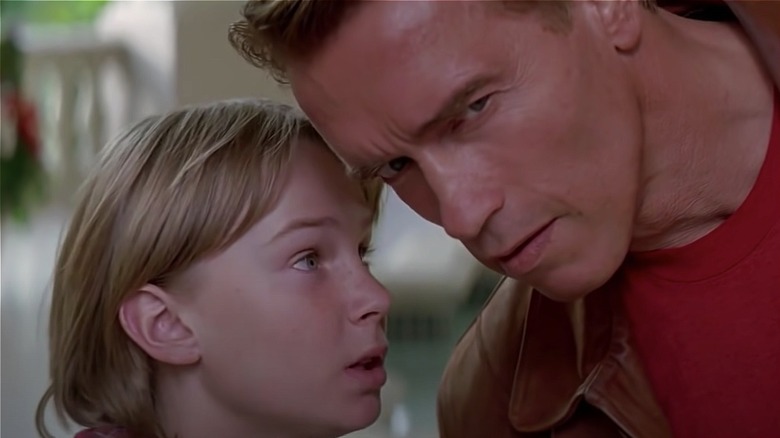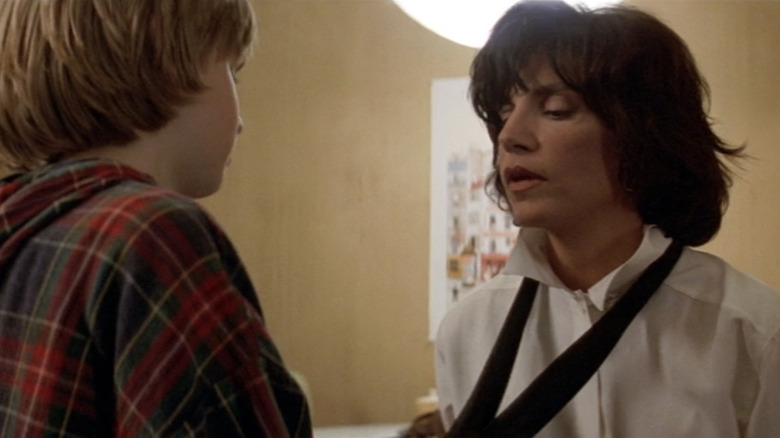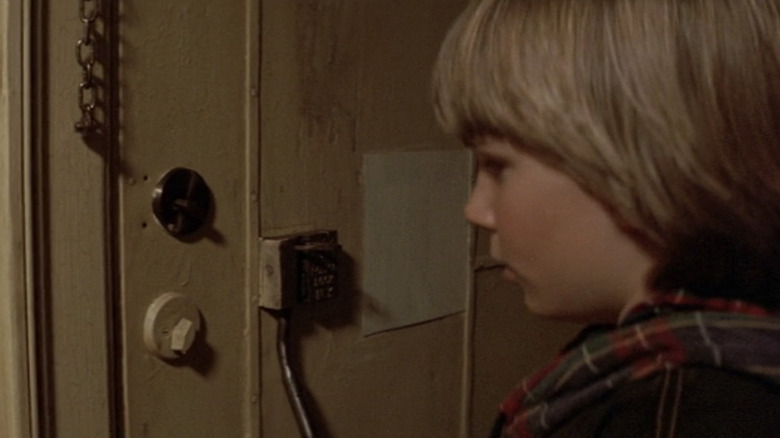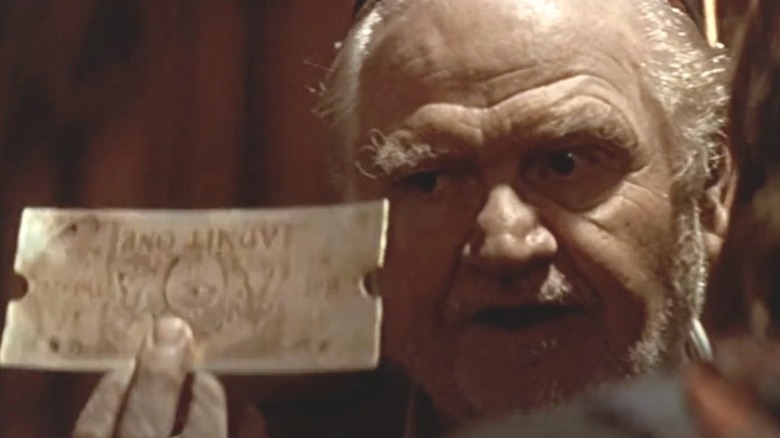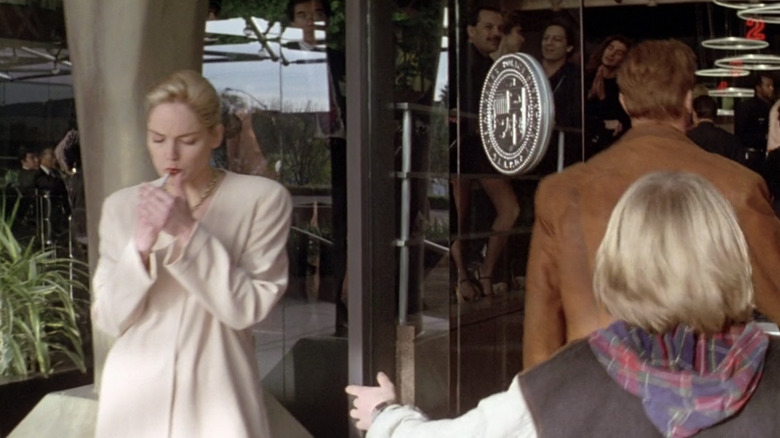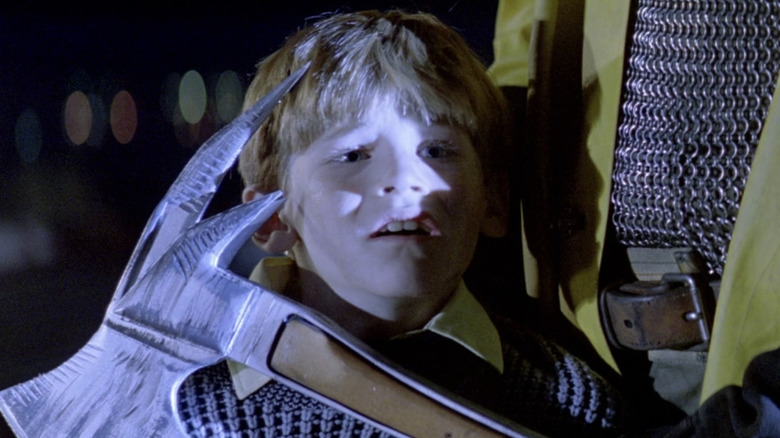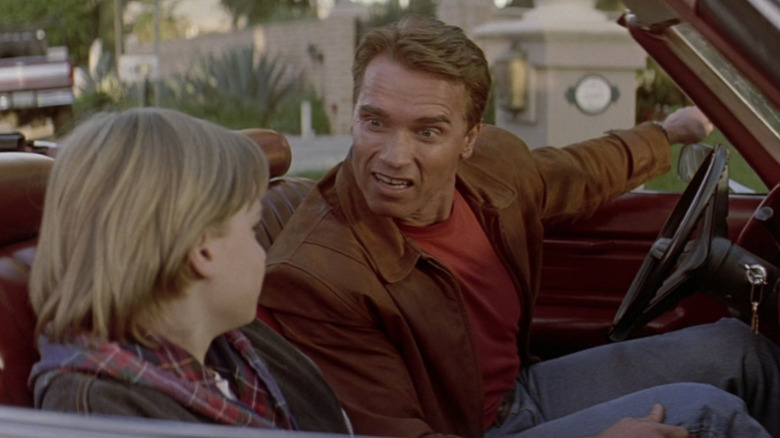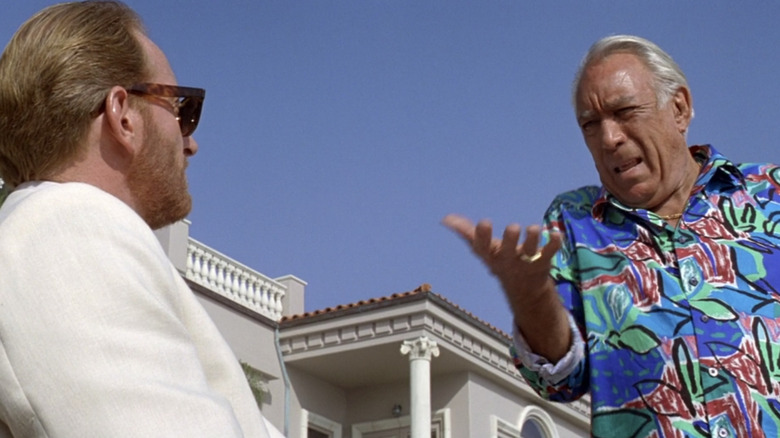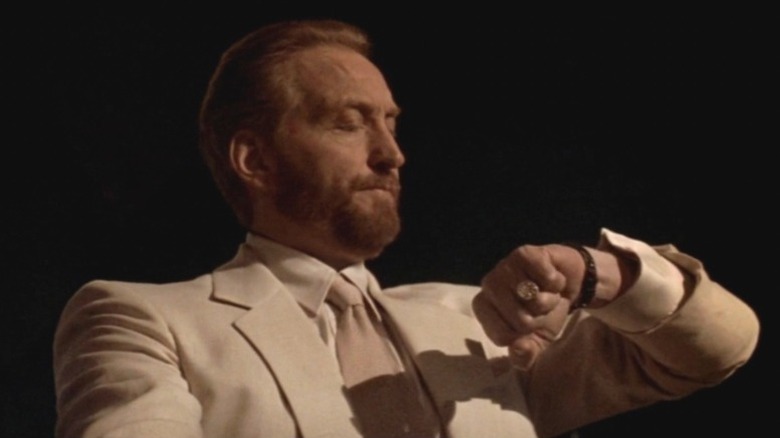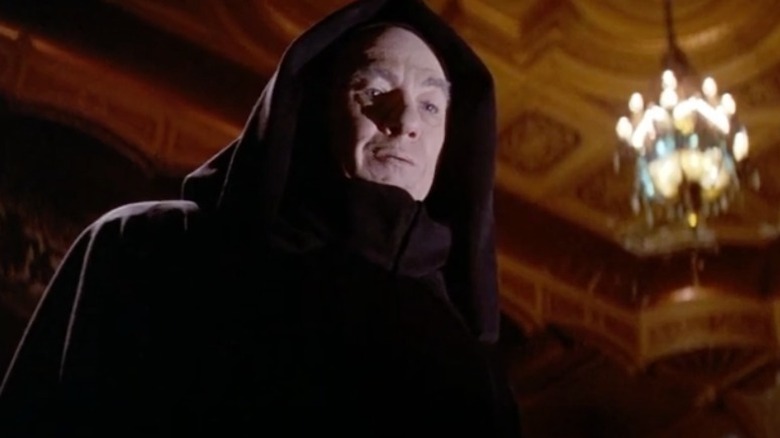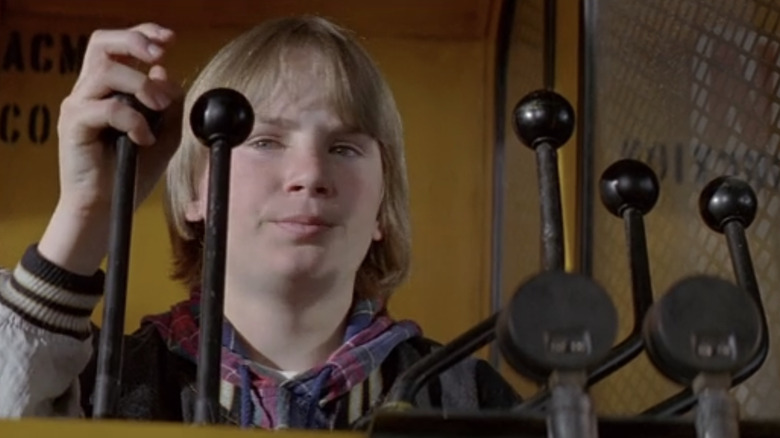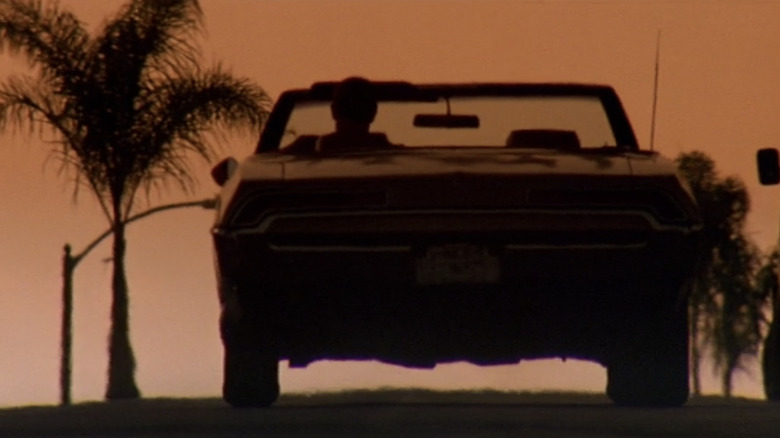Things Only Adults Notice In Last Action Hero
Movies are magical as they allow audience members to briefly escape reality while they're zapped into the screen. Living vicariously through our favorite characters might as well be a rite of passage. "Last Action Hero" brings this supernatural phenomenon to life when a young kid receives a movie ticket and is quite literally zapped into his favorite movie character's fictional world. Though a PG-13 flick, along the way, the story's elements likely land differently for adults and kids alike.
"Last Action Hero," follows Danny Madigan (Austin O'Brien), a young cinephile who's obsessed with fictional action movie persona Jack Slater (Arnold Schwarzenegger). Though an action-comedy, "Last Action Hero" is also meta and satirical as it's a story inside a story –– and it not only makes fun of itself and its characters but also ribs action movies in general. Even Schwarzenegger, who plays himself and Jack, pokes fun at both characters in the film. Yet the movie's premise is still gripping and provides a unique spin to a genre that typically sticks to formulaic rules. Here are the elements only adults are likely to catch in this entertainingly self-aware romp.
It's hard not to feel bad for Danny and his mother
Although it's glossed over, Danny and his mom, Irene (Mercedes Ruehl), don't have the best home life. After all, Irene mentions that she's a widow –– and from the looks of their front door, they clearly don't live in the best neighborhood. Irene tells Danny to lock the door the moment she leaves –– and there's also a makeshift lock that's attached to the ground. Yet the moment Danny tries to leave his apartment, an intruder barges through the door. Danny is then held at knifepoint, hand-cuffed, and robbed. The robber has the nerve to complain that Danny lacks valuables.
Though these events are easy to overlook as a kid, especially since the plot moves past them quickly, more seasoned viewers will feel bad for Danny's living situation as he and his mother live in a dangerous neighborhood and can't seem to escape. The moment Danny opens his door, he's attacked –– and that should never happen. Although Danny eventually goes on the adventure of a lifetime, he returns to his dismal real life at the end of the movie.
Danny's obsession with movies helped him get over a traumatic situation
To recap, a man broke into Danny's home while his mom was at work. Yet, he inevitably shrugs these events off and ventures to the movie theater to enjoy a flick. Adults likely understand that trauma has a sneaky way of showing up later in life, but Danny is seemingly able to get over his distressing situation in a matter of hours thanks to his love of movies. Most people who experienced what Danny went through would have either called the police, or at the very least, just stayed home in shock in the aftermath of being violently victimized.
But not Danny. He's so obsessed with seeing the next "Jack Slater" movie that he's able to shrug the robbery off and lose himself in cinema. We're not saying this is implausible –– we're simply saying that Danny's relatively quick rebound from a horrible situation is an unrealistic plot device to propel the story forward.
All the questions surrounding the magic ticket
Nick (Robert Prosky), who seemingly owns the theater and is also the projectionist, decides to give Danny a ticket that was apparently once owned by the legendary magician Harry Houdini. He's not sure what type of wizardry the ticket possesses, but he's certain Danny can get more value out of it. Though younger viewers might accept this magical ticket's powers and let the story's events take them on an action-filled adventure, it's harder for adults to accept this ticket at face value.
First off, why would Nick give the ticket away? If he really believed it was Houdini's, why didn't he try to sell it, as he doesn't seem to come from the greatest means (note: his rundown theater is in the presumed bad part of town)? How does the ticket even work? Do its powers work on TV sets or just at movie theaters? Because the ticket wasn't explained and the audience is just supposed to accept its magical force, endless questions remain.
There's an outrageous amount of celebrity cameos
"Last Action Hero" really brings it with a plethora of actors playing themselves. "Jack Slater IV" has yet to be released, and the screening of the film naturally takes place in the real-life universe shortly after Danny gets zapped into the movie. Yet when Danny and Jack reenter the real world (yes, Jack Slater, a fictional character, comes to the real world), they attend the actual screening of the film. Now, that's trippy.
At the screening, Little Richard and Jim Belushi have cameos as themselves. And since Arnold Schwarzenegger plays Jack Slater in the metafilm, he, of course, attends the screening ... as himself. The cameos went off the rails, however, with Sharon Stone having a brief part as her "Basic Instinct" character, Catherine Tramell, in the "Jack Slater IV" universe. Robert Patrick even appeared in the "Jack Slater IV" universe as the T-1000 from "Terminator 2: Judgement Day." In Jack's world, Sylvester Stallone also appeared on movie posters as the titular character in the "Terminator" franchise, replacing Schwarzenegger, naturally. Believe it or not, there were even more cameos outside of these occurrences.
Can Jack save his son?
In Jack Slater's world, his archenemy is the Ripper (Tom Noonan), a villain he killed while causing some tragic collateral damage; as the Ripper falls to his death from the roof of a building, he drags Jack's son with him. Yet fellow villain Benedict (Charles Dance) retrieves the magical ticket later on and escapes to the real world, where he discovers bad guys can actually win. So he decides to bring back villains from other movies to try to kill Jack. Naturally, he resurrects (if you will) the Ripper. Though kids might not think about the logistics of this move, it's harder for more seasoned audience members to not wonder that if the Ripper can come back to life, can Jack's son?
With that said, it's complicated. According to the logic established by Benedict's moves, Jack would need the magic ticket to enter the real world so he could enter a previous screening of his film –– and then maybe he could save his kid. He would then ostensibly need to bring his kid to the real world and enter another screening of one his films that takes place after his son's death, to ensure cinematic history wouldn't repeat itself.
Danny becoming Jack's partner is absurd
We understand Danny is stuck in a movie and the point is pretty much anything goes. Elements in movies are far-fetched. But a more seasoned viewer will wonder why no one tries to find his parents in Jack's universe. There's still right and wrong in this realm and Danny finds himself at a police station. Surely, someone would find out who his legal guardians are, although, to be fair, they did look him up in the system and he's obviously not in it because he's in a fictional world where he doesn't exist.
But instead of involving some type of child welfare agency, Jack's boss pairs him and Danny together to solve a case. Of course, this is also in a universe where Whiskers (voiced by Danny DeVito), a cartoon cat detective, is also on the force –– and no one questions it. Really, Danny never stood a shot at finding shelter at a secure location. But at least he got to fight crime with his on-screen hero.
Why does Benedict work for Tony?
Benedict works for Tony Vivaldi (Anthony Quinn), the main antagonist of "Jack Slater IV." Time and time again, Benedict proves to be more intelligent, powerful, and talented, in every way, than Tony. Yet Benedict somehow got stuck doing Tony's dirty work. Of course, "Last Action Hero" is not the first or last film to explore the trope of the hapless bad guy with a crew of exasperated henchmen — The "Austin Powers" films made an entire meal out of the concept — but it makes little sense in this film or any others.
Tony, at times, treats Benedict as his assistant, yet Benedict appears to be a competent assassin when he's not chasing after the movie's hero, Jack Slater. Eventually, Benedict becomes the main antagonist of the movie — by finally murdering Tony — in a moment relished by the character when he says, "If God was a villain, he'd be me." This also makes little sense, because at what point was God a lackey for a more powerful entity? At any rate, Benedict does prove himself to be a formidable foe, however, this is a satire of an action movie in which he goes up against a character who's played by Arnold Schwarzenegger — who for all intents and purposes, is actually a god in that realm.
Just how dangerous were the streets in '90s New York?
Younger minds can't always comprehend the woes of life, and they don't always understand that the world is infested with crime. When Benedict is in real-world New York, he kills a man to see if anyone will notice. Benedict makes a point of how dangerous New York supposedly is by shooting this man –– and no one helps him. An off-screen voice even tells Benedict to be quiet after he yells that he's murdered someone, which somewhat plays on the real-life concept of the bystander effect — described by Psychology Today as a phenomenon in which the more observers there are to a crisis situation, the less likely it is for any one of them to take individual action.
Kid viewers are unlikely to pick up on the film's social commentary surrounding Benedict's actions. But adults may find themselves asking: Are there streets in New York that are really dangerous enough for someone to commit an undetected murder? Are people so used to violence that they simply look the other way? Though "Last Action Hero" is satirical and makes fun of the world around it, the film is certainly making a point about some areas of '90s New York.
How does Death keep his powers?
Benedict uses the magical ticket to pull villains out of other movies so he can create chaos and havoc in the real world. One of the fictional characters he brings to the present is Death (Ian McKellen) from the film "The Seventh Seal." Death subsequently taps a man who's smoking and that man starts choking. Depending on what side you stand on, it can be presumed that the man dies, implying that Death still has his powers.
A more seasoned audience member will realize this aspect and wonder how Death keeps his abilities but Jack Slater doesn't, which is one of the running gags in "Last Action Hero." Though Jack is a human in both universes, in his own world, he's practically invincible and never dies even in clearly fatal situations. But unlike Death, Jack doesn't keep these powers in the real world. Case in point: He almost dies after getting shot. The cure, of course, is simply Jack returning to his cinematic world, where his once-near-fatal wound is virtually a scratch.
The film is a satire at heart and it's not meant to be taken seriously
There's a whole lot of nit-picking that can be unleashed on "Last Action Hero." For example, in one scene, a funeral takes place on top of a building in Jack's realm. Everyone at the funeral has guns and Danny somehow operates a crane with precision. "Last Action Hero" not only makes fun of action movies, it is self-deprecating to boot, mocking its own choices, and even of Arnold Schwarzenegger himself in the "real world" portions of the film.
Adults will notice that this movie is a satire and it's not meant to be taken seriously. The film makes the point that action movies are overplayed and the plots tend to be simple and universal. Action movies are all about explosions and spawning sequels –– at all costs. But, since "Last Action Hero" has the awareness of what's going on inside and outside of the movie, it uses that awareness to repeatedly not to the audience, providing comedic elements and relief in the process.
All this is to say that there's likely no way that kids understand this type of meta comedy, so it's unclear if any of these jokes even landed with a younger audience — the film is PG-13, after all.
Good people don't always win in real life, but movies still provide pleasant escapism
In the main universe where Danny lives, it's evident that good people don't always win. His story is proof that life is undeniably hard and sometimes unfair. Yet he escapes from his problems by inserting himself into the plots of movies. Adults will realize that this is similar to real life. Despite action movies sometimes having flimsy and formulaic plots, they still provide pleasing entertainment and can help people escape the trials and tribulations of everyday life, which is a heroic message if we've ever seen one.
Ultimately, none of these realizations take away from "Last Action Hero." Danny returns to his world while Jack gets to live out his fictional days in a faraway land. Whether these underlying messages hit kids and adults differently or not, all viewers are united in appreciating an action movie that's not afraid to have fun, even if it's at the expense of itself.
